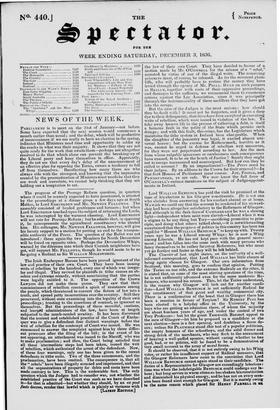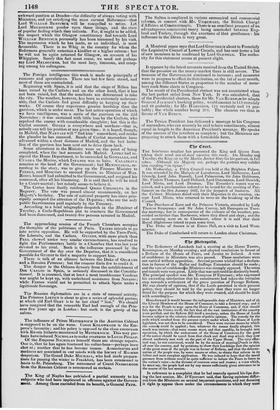Lord WILLtAsi Bzwristcx has paid the visit he promised at
the time of his election to his Glasgow constituents. He is not one who shrinks from answering for his conduct abroad or at home. We wish we could say that the account he rendered of his steward- ship had been altogether satisfactory to the Reformers of Glasgow. But although in the dark days of CASTLEREAGH he was a shining light—independent when most were slavish—Liberal when it was a stigma to be any thing but Tory—sacrificing promotion to prin- ciple, and doing what others talked about,—it is .notwithstanding ascertained that the progress of politics in this country has been too rapid for "Honest WILLIAM BENTINCK " to keep up with. Twenty years ago lie was a Liberal among Whigs ; he is now a Whig among Liberals. He has not kept pace with the general move- ment ; and has fallen into the same rank with many persons who fancy themselves to be rather forgoing Reformers, but who must yet go further and faster or they will be left behind. The Courier of last night states, on the autitority of a well- informed correspondent, that Lord WILLIAM has little chance of being again chosen for Glasgow. Our own information from Scotland, this morning, goes to confirm that opinion. Putting the Tories on one side, and the extreme Radicals on the other, it is stated that, on some of the most stirring questions of the time, he is not sufficiently advanced even for the more moderate Re- formers, who secured his return. This, let the Tories understand, is the reason why Glasgow will look out for another candi- date—Lord WILLIAM BENTINCK is not sufficiently Radical for the constituency of that great and wealthy commercial city. There is a confirmation of the boast that in Glasgow there has been a reaction in favour of Toryism ! Sir ROBERT PEEL has been elected to a holyday office in the University, by the boys who are getting an education there, of whom the majority are about fourteen years of age, and under the control of two Tory Professors : but let the great Tamworth Baronet appeal to the men of Glasgow—let him be proposed as a candidate at the next election—here is a fair opening, and doubtless a fierce de- sire; unless Sir PLAUSIBLE stand this test of a popular politician, the empty honours of the schoolboys, and the solid dinner and strong drink of the merchants, who may flock to the amusement of' hearing a well-puffed spouter, without caring whether be has good, bad, or no politics, will be found to be a demonstration of very small account in the array of moral forces. It should be observed, that it is not entirely owing to his Whig votes, or rather his insufficient support of Radical measures, that the Glasgow Reformers have come to the conviction that Lord WILLIAM BENTINCK cannot again stand as their candidate. The duties of a Representative for Glasgow are exceedingly laborious: time was when the indefatigable BENTINCK could undergo any la- bour; but long service in warm climates has shaken his constitution and diminished his physical energy, and he has not on every occa- sion been found alert enough for Glasgow. But it is mainly owing to the same reason which placed Sir HENRY PARNELL in an awkward position at Dundee—the difficulty of always voting with Ministers, and yet satisfying the more earnest Reformers—that Lord WILLIAM BENTINCK will be compelled to retire. Let Lord MELBOURNE ponder upon these things, and the state of popular feeling which they indicate. For, it ought to be added, the respect which the Glasgow constituency feel towards Lord WILLIAM BENTINCK personally has been increased by his visit. The impression which he has made, as an individual, is most favourable. There is no Whig in the country for whom the Reformers generally entertain a kindlier or a higher esteem : but be will not be again returned for Glasgow, on account of his Whiggism. Surely this fact must rouse, we need not perhaps say Lord MELBOURNE, but the most lazy, timorous, and creep- ing among his colleagues.



























